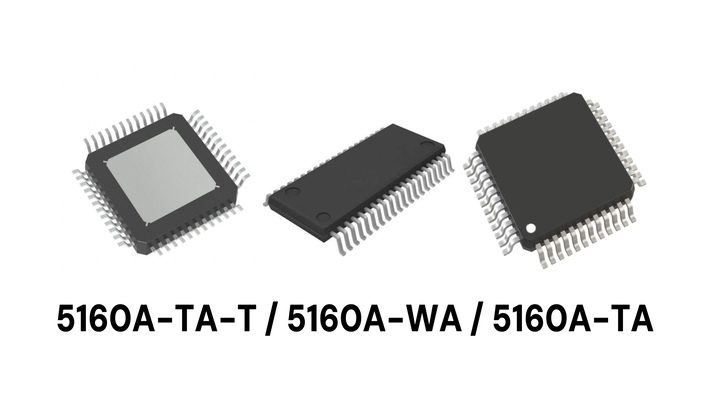
In industrial automation, robotic systems, and high-precision motion platforms, stepper-motor drivers play a decisive role not only in positioning accuracy but also in dynamic response, noise control, and overall operating stability. As equipment increasingly demands higher current capability, lower vibration, and stronger environmental robustness, choosing among different packages, thermal designs, and production processes has become an essential part of optimizing motor-drive solutions.
Trinamic’s TMC5160 series is a proven, high-performance stepper-driver family that supports a wide range of applications—from general industrial equipment to high-reliability systems. This guide compares three representative models—TMC5160A-TA-T, TMC5160A-WA, and TMC5160A-TA—and provides practical selection insights through parameter and application analysis.
Parameter Comparison
| TMC5160A-TA-T | TMC5160A-WA | TMC5160A-TA | |
| Output Current | 20 A | 20 A | 20 A |
| Supply Range | 10–50 V | 10–50 V | 10–50 V |
| Microstepping | 1–1/256 | 1–1/256 | 1–1/256 |
| Temperature Rating | −40°C to 125°C | −40°C to 125°C | −40°C to 125°C |
| Package | 48-TQFP-EP | 56-QFN + WF | 48-TQFP-EP |
| Production Adaptability | Reel → Mass production | Wettable-flank → High-reliability equipment | Tray → Development / Low-volume |
| Product Positioning | Standard driver for volume builds | Higher-stability, higher-performance systems | Prototyping / Pilot-run version |
Application Analysis
TMC5160A-TA-T
Designed for industrial-scale production, the TMC5160A-TA-T uses a TQFP-EP package that supports AOI inspection, easy rework, and straightforward debugging. It offers stable thermal behavior and reliable manufacturability. This version fits most motion-control boards and maintains consistent output even under fluctuating temperatures, current surges, and long-duration operation.
Typical applications include CNC controllers, automation actuators, and mid- to high-current stepper systems—striking a strong balance between volume-production consistency, ease of debugging, and overall performance.
TMC5160A-WA
The TMC5160A-WA adopts a 56-QFN wettable-flank package, providing a shorter thermal path, lower parasitic inductance, reduced EMI, and AOI-visible solder joints—making it a high-reliability option.
This version delivers more stable current control and lower noise in systems with high-speed current loops, long operating hours, or sensitivity to electromagnetic interference.
It is widely used in medical devices, robotic joint modules, automotive-trend applications, and high-end motion platforms that demand superior long-term reliability and silent operation.
TMC5160A-TA
Technically identical to the TA-T version, the TMC5160A-TA is supplied in tray packaging, making it ideal for prototype development and small pilot runs. The TQFP package is convenient for engineers who need to swap chips frequently, check solder joints, or revise schematics and PCBs—offering maximum flexibility during early design stages.
Typical uses include development boards, test platforms, low-volume systems, and designs requiring repeated tuning of the current loop. It also serves as a natural transition model from prototyping to mass production.
Design Considerations
Current-loop design
All three models support 20 A peak current. PCB layouts should minimize power-loop length and reduce MOSFET parasitic inductance to prevent switching spikes.
Thermal-path planning
The WA’s QFN package offers better heat dissipation, making it suitable for high duty cycles or sustained high-current workloads. TA/TA-T designs need reinforced EP pads and thermal copper planes.
EMI control
The WA package’s lower parasitics help reduce EMI risk. TQFP versions require careful routing and ground-plane optimization to maintain signal integrity.
Manufacturing compatibility
TA-T is optimized for high-speed SMT production.
TA fits prototyping needs.
WA, with its wettable flanks, satisfies factories with stricter solder-joint inspection requirements.
Replacement & Migration Guidance
TMC5160A-TA-T ↔TMC5160A-TA
These two models share the same package and are fully compatible—ideal for moving from R&D evaluation to mass production without changing the PCB.
TMC5160A-TA-T ↔TMC5160A-WA
Interchangeable but requires PCB redesign. WA is better suited for systems with greater thermal demands, EMI sensitivity, or high reliability requirements.
TMC5160A-TA ↔TMC5160A-WA
PCB redesign is required. This path fits projects that prototype with TA but ship the final high-performance product using WA.
The TMC5160A-TA-T, TMC5160A-WA, and TMC5160A-TA represent the TMC5160 line across R&D, mass production, and high-reliability applications. Differences in package structure, manufacturability, thermal behavior, and reliability form a clear product segmentation, helping engineers choose the right model based on environment, development stage, and production needs. Across industrial automation, medical platforms, and robotic systems, the series offers a dependable balance of performance, stability, and practicality.
Key Takeaways
TA-T = Mass-production standard
WA = High-performance / high-reliability
TA = For prototyping & small runs
WIN SOURCE offers in-stock availability and technical support for all three TMC5160 models, helping customers move efficiently from R&D validation to full-scale production. Visit WIN SOURCE for real-time inventory and lead-time updates to ensure long-term stability in both system design and supply planning.
©2025 Win Source Electronics. All rights reserved. This content is protected by copyright and may not be reproduced, distributed, transmitted, cached or otherwise used, except with the prior written permission of Win Source Electronics.

COMMENTS